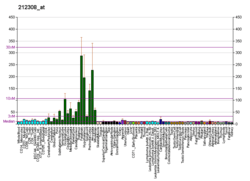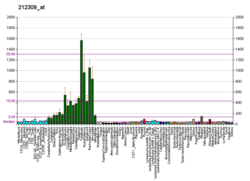CLASP2
Cytoplasmic linker associated protein 2, also known as CLASP2, is a protein which in humans is encoded by the CLASP2 gene.[3]
References
External links
- Human CLASP2 genome location and CLASP2 gene details page in the UCSC Genome Browser.
Further reading
- Galjart N (2005). "CLIPs and CLASPs and cellular dynamics.". Nat. Rev. Mol. Cell Biol. 6 (6): 487–98. PMID 15928712. doi:10.1038/nrm1664.
- Ishikawa K, Nagase T, Suyama M, et al. (1998). "Prediction of the coding sequences of unidentified human genes. X. The complete sequences of 100 new cDNA clones from brain which can code for large proteins in vitro.". DNA Res. 5 (3): 169–76. PMID 9734811. doi:10.1093/dnares/5.3.169.
- Lemos CL, Sampaio P, Maiato H, et al. (2000). "Mast, a conserved microtubule-associated protein required for bipolar mitotic spindle organization.". EMBO J. 19 (14): 3668–82. PMC 313969
 . PMID 10899121. doi:10.1093/emboj/19.14.3668.
. PMID 10899121. doi:10.1093/emboj/19.14.3668. - Akhmanova A, Hoogenraad CC, Drabek K, et al. (2001). "Clasps are CLIP-115 and -170 associating proteins involved in the regional regulation of microtubule dynamics in motile fibroblasts.". Cell. 104 (6): 923–35. PMID 11290329. doi:10.1016/S0092-8674(01)00288-4.
- Strausberg RL, Feingold EA, Grouse LH, et al. (2003). "Generation and initial analysis of more than 15,000 full-length human and mouse cDNA sequences.". Proc. Natl. Acad. Sci. U.S.A. 99 (26): 16899–903. PMC 139241
 . PMID 12477932. doi:10.1073/pnas.242603899.
. PMID 12477932. doi:10.1073/pnas.242603899. - Maiato H, Fairley EA, Rieder CL, et al. (2003). "Human CLASP1 is an outer kinetochore component that regulates spindle microtubule dynamics.". Cell. 113 (7): 891–904. PMID 12837247. doi:10.1016/S0092-8674(03)00465-3.
- Ota T, Suzuki Y, Nishikawa T, et al. (2004). "Complete sequencing and characterization of 21,243 full-length human cDNAs.". Nat. Genet. 36 (1): 40–5. PMID 14702039. doi:10.1038/ng1285.
- Lee H, Engel U, Rusch J, et al. (2004). "The microtubule plus end tracking protein Orbit/MAST/CLASP acts downstream of the tyrosine kinase Abl in mediating axon guidance.". Neuron. 42 (6): 913–26. PMID 15207236. doi:10.1016/j.neuron.2004.05.020.
- Gerhard DS, Wagner L, Feingold EA, et al. (2004). "The status, quality, and expansion of the NIH full-length cDNA project: the Mammalian Gene Collection (MGC).". Genome Res. 14 (10B): 2121–7. PMC 528928
 . PMID 15489334. doi:10.1101/gr.2596504.
. PMID 15489334. doi:10.1101/gr.2596504. - Mimori-Kiyosue Y, Grigoriev I, Lansbergen G, et al. (2005). "CLASP1 and CLASP2 bind to EB1 and regulate microtubule plus-end dynamics at the cell cortex.". J. Cell Biol. 168 (1): 141–53. PMC 2171674
 . PMID 15631994. doi:10.1083/jcb.200405094.
. PMID 15631994. doi:10.1083/jcb.200405094. - Wittmann T, Waterman-Storer CM (2005). "Spatial regulation of CLASP affinity for microtubules by Rac1 and GSK3beta in migrating epithelial cells.". J. Cell Biol. 169 (6): 929–39. PMC 2171640
 . PMID 15955847. doi:10.1083/jcb.200412114.
. PMID 15955847. doi:10.1083/jcb.200412114. - Lansbergen G, Grigoriev I, Mimori-Kiyosue Y, et al. (2006). "CLASPs attach microtubule plus ends to the cell cortex through a complex with LL5beta.". Dev. Cell. 11 (1): 21–32. PMID 16824950. doi:10.1016/j.devcel.2006.05.012.
- Mimori-Kiyosue Y, Grigoriev I, Sasaki H, et al. (2006). "Mammalian CLASPs are required for mitotic spindle organization and kinetochore alignment.". Genes Cells. 11 (8): 845–57. PMID 16866869. doi:10.1111/j.1365-2443.2006.00990.x.
- Pereira AL, Pereira AJ, Maia AR, et al. (2007). "Mammalian CLASP1 and CLASP2 cooperate to ensure mitotic fidelity by regulating spindle and kinetochore function.". Mol. Biol. Cell. 17 (10): 4526–42. PMC 1635371
 . PMID 16914514. doi:10.1091/mbc.E06-07-0579.
. PMID 16914514. doi:10.1091/mbc.E06-07-0579. - Ewing RM, Chu P, Elisma F, et al. (2007). "Large-scale mapping of human protein-protein interactions by mass spectrometry.". Mol. Syst. Biol. 3 (1): 89. PMC 1847948
 . PMID 17353931. doi:10.1038/msb4100134.
. PMID 17353931. doi:10.1038/msb4100134.
This article is issued from
Wikipedia.
The text is licensed under Creative Commons - Attribution - Sharealike.
Additional terms may apply for the media files.


